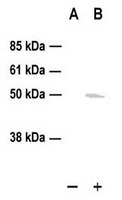PC386 Sigma-AldrichPhosphoDetect™ Anti-p53 (pSer¹⁵) (Ab-3) Rabbit pAb
This PhosphoDetect™ Anti-p53 (pSer¹⁵) (Ab-3) Rabbit pAb is validated for use in Immunoblotting , Immunoprecipitation for the detection of p53 (pSer¹⁵) (Ab-3).
More>> This PhosphoDetect™ Anti-p53 (pSer¹⁵) (Ab-3) Rabbit pAb is validated for use in Immunoblotting , Immunoprecipitation for the detection of p53 (pSer¹⁵) (Ab-3). Less<<Recommended Products
Overview
| Replacement Information |
|---|
Key Specifications Table
| Species Reactivity | Host | Antibody Type |
|---|---|---|
| H, M, R | Rb | Polyclonal Antibody |
Products
| Catalog Number | Packaging | Qty/Pack | |
|---|---|---|---|
| PC386-50UL | Plastic ampoule | 50 ul |
| Product Information | |
|---|---|
| Form | Liquid |
| Formulation | In 150 mM NaCl, 10 mM sodium HEPES, 100 µg/ml BSA, 50% glycerol, pH 7.5. |
| Positive control | PC-12, HCT116, or HeLa cells treated with DNA damaging agents |
| Preservative | None |
| Quality Level | MQ100 |
| Physicochemical Information |
|---|
| Dimensions |
|---|
| Materials Information |
|---|
| Toxicological Information |
|---|
| Safety Information according to GHS |
|---|
| Safety Information |
|---|
| Product Usage Statements |
|---|
| Packaging Information |
|---|
| Transport Information |
|---|
| Supplemental Information |
|---|
| Specifications |
|---|
| Global Trade Item Number | |
|---|---|
| Catalog Number | GTIN |
| PC386-50UL | 04055977224559 |
Documentation
PhosphoDetect™ Anti-p53 (pSer¹⁵) (Ab-3) Rabbit pAb SDS
| Title |
|---|
PhosphoDetect™ Anti-p53 (pSer¹⁵) (Ab-3) Rabbit pAb Certificates of Analysis
| Title | Lot Number |
|---|---|
| PC386 |
References
| Reference overview |
|---|
| Tibbetts, R.S., et al. 1999. Genes Dev. 13, 152. Levine, A.J. 1997. Cell 88, 323. Milczarek, G.J., et al. 1997. Life Sci. 60, 1. Shieh, S.Y., et al. 1997. Cell 91, 325. Meek, D.W. 1994. Semin Cancer Biol. 5, 203. |








